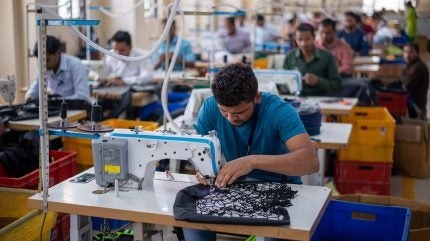
The guidelines are said to represent the successful conclusion of a three-year collaborative effort between ABFRL and GIZ and were launched at the Sankalp Bharat Summit 2024 held in Varanasi in the Indian state of Uttar Pradesh.
ABFRL managing director Ashish Dikshit said: “Our three-year partnership with GIZ has been a transformative journey that showcases the true power of industry collaboration in achieving a meaningful change. The launch of these circularity guidelines marks a defining moment for us, reflecting our unyielding commitment to collaborate with the fashion industry towards sustainability and to champion the development of a circular textile ecosystem.”
Titled ‘Stitching the Circle: A Roadmap for Circular Textiles & Apparel in India,’ the manual provides a detailed framework to support textile companies in their shift from traditional linear production processes to a more sustainable circular economy approach.
It summarises various projects executed under the partnership between ABFRL and GIZ, all centred around enhancing sustainability, minimising waste and improving resource efficiency throughout the textile production chain.
The guidelines propose practical steps for embracing a circular model within the industry, featuring a 6R Framework (Redesign, Reduce, Reuse, Remanufacture, Recycle, Regenerate). This model serves as a blueprint for businesses seeking to reduce waste and optimise resource utilisation.
The document also outlines Key Performance Indicators (KPIs) for organisations to gauge their progress in circularity and suggests alignment with international sustainability standards.
Featuring case studies and proven strategies, the document is designed as an operational handbook for Indian businesses looking to integrate circular principles into their production processes. This includes sourcing eco-friendly materials and engaging consumers in sustainable practices. The goal is to work together towards establishing a resilient textile ecosystem in India.
The cooperative effort between ABFRL and GIZ was initiated with the intent to mitigate environmental impacts associated with the textile sector. Throughout the three-year collaboration, the duo have launched significant efforts to revolutionise India’s textile industry.
These include the launch of an extensive baseline survey on circularity practices, the Circularity Innovation Challenge 2023 to stimulate eco-friendly innovations, and a widespread educational programme called Decoding Circularity Together, which aims to equip industry stakeholders with necessary knowledge.
ABFRL and GIZ also implemented pilot projects aimed at incorporating circular methodologies into the textile supply chain and created engaging narratives to spread awareness and motivate broader adoption.
Looking ahead, both entities pledge to persist in their efforts to empower industry participants, scale up pilot initiatives, and champion the broad implementation of circular strategies across the sector.
GIZ India climate change and circular economy senior advisor Meghana Kshirsagar said: “The cooperation with ABFRL has great potential to initiate and scale circular economy and resource efficiency approaches in the Indian textile industry. In our opinion, combining the strengths of public and private sector partners creates a win-win scenario, delivering both development benefits for local populations and business advantages for private companies.”
ABFRL claims to be India’s first fashion-focused company to reach a billion-dollar revenue and offers a diverse portfolio of prominent fashion brands and retail formats. The company’s network includes 4,664 stores, 37,205 multi-brand outlets, and 9,563 points of sale in department stores across India.



